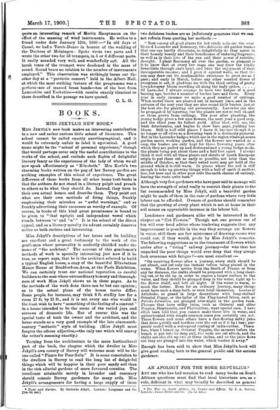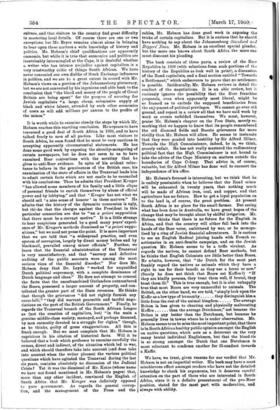AN APOLOGY FOR THE BOER REPUBLICS.* ANY one who has
had occasion to read many books on South African questions must find that local historians are, as a rule, deficient in what may broadly be described as general
• The War in. South Africa: its Causes and Effects. By J. A. Hobson London : Jane; Nisbet and Co. L7e. Cd. net.]
inextricably intermingled at the Cape, it is doubtful whether a writer who has intense prejudice against capitalism is a in politics, and we are to a great extent in accord with Mr.
Hobson's views on a portion of the Johannesburg plutocracy, but we are not converted by his ingenious and able book to the conclusion that " the blood and money of the people of Great Britain are being spent" for the purpose of securing for black and white labour, attended by such other economies of costs as will add millions per annum to the profits of the mines."
to admit certain facts which are not easily to be reconciled with his conclusions. Thus he admits that President Kruger "has allowed some members of his family and a little clique will be exhausted in twenty years, that nothing much of personal friends to enrich themselves by abnae of official power and by lobbying," and that "Kruger has not what we agriculture has no future. How to get a loyal population on should call a nice sense of honour' in these matters." He admits that the history of the dynamite concession is ugly, to the land is, of course, the great problem. At present but thinks that the charges against the President in this South Africa is no place for the small farmer. But seeing
particular connection are due to "an a priori supposition
that there must be a corrupt motive." It is a little strange to bear suspicions generated by a good many years' experi-
ence of Mr. Kruger's methods dismissed as " a priori suppo-
sitions," but we need not press the point. It is more important that we are told that "a widespread practice, and even system of corruption, largely by direct money bribes and by blackmail, prevailed among minor officials." Further, we actionaries in an anti-Semite campaign, and on the Jewish learn that the financial administration of the Transvaal question Mr. Hobson seems to be is very unsatisfactory, and that "secrecy and defective regards the natives, he cannot defend Boer methods, but auditing of the public accounts were among the most he thinks that English Colonists are little better than Boers. He admits, however, that " the Dutch for the most part serious vices of the financial disorder." Nor does Mr. Hobson deny that Dr. Leyds " worked for unqualified frankly regard the natives as animals which they have a Dutch political supremacy, with a complete dominance of right to use for their benefit as they use a horse or cow." Dutch language and ideas." He does not attempt to conceal (Surely he does not think that Boers eat Ka.ffirs ?) "If the facts that the unenfranchised Outlanders outnumbered they are kindly persona, they treat them well, if brutal, they the Beers, possessed a larger amount of property, and con-
treat them ill." This is true enough, but it is also unhappily tributed the greater part of the State revenues, He thinks tree that most Boers are very unmerciful to animals. The that though the grievances " did not rightly furnish any British, on the other hand, we are told, " simply look upon the easus belli," " they did warrant peaceable and tactful sego-
tiations on the part of the British Government." Finally, he little from the rest of the animal kingdom The average regards the Transvaal branch of the South African League Briton is less given to cheating and physically maltreating
as (not the creation of capitalists, but) "in the main a Ka.ffirs than the average Dutchman, not because the genuine middle-class society, managed, and perhaps financed, Briton is any better than the Dutchman, but because he nerally lives in town where he is under observation. Mr. by men earnestly devoted to a struggle for rights," though,
as he thinks, guilty of gross exaggerations. All this is frank enough. But we must complain that Mr. Hobson is capricious in his citation of historical facts. Will it be believed that a book which professes to examine carefully the causes, direct and indirect, of the situation which led to war, and which should therefore take into account (and does take into account when the writer pleases) the various political
questions which have agitated the Transvaal during the last We have, we trust, given reasons for our verdict that Mr. six years, contains absolutely no discussion of the Judicial Hobson is not an impartial writer. His book may have a most Crisis ? Yet it was the dismissal of Mr. Kotze (whose name mischievous effect amongst readers who have not the detailed we have not found mentioned in Mr. Hobson's pages) that, knowledge to check his arguments, but it deserves careful more than any other incident, convinced the English of attention on the part of those who are interested in South South Africa that Mr. Kruger was definitely opposed Africa, since it is a definite presentment of the pro-Boer to pure government. As regards the general corral)• position, stated for the most part with moderation, and tion, and the management of the Press and the always with ability. culture, and that visitors to the country find great difficulty cables, Mr. Hobson has done good work in exposing the in mastering local details. Of -course there are one or two tricks of certain capitalists. But it is curious that he should exceptions. but Mr. Bryce remains almost alone in bringing have nothing to say about the Johannesburg Standard and to bear upon these matters a wide knowledge of history and Diggers' News. Mr. Hobson is an excellent special pleader, politics. Mr. Hobson's chief qualifications are apparently but the more one knows about South Africa the more one economic, but while it is true that economics and politics are must discount his pleading.
The book consists of three parts, a review of the Boer Republics in 1899 (with selections from such portions of the very trustworthy critic of things South African. We have history of the Republics as look well in print), a discussion never concealed our own dislike of Stock Exchange influences of the Rand capitalists, and a final section entitled " Towards a Settlement," which endeavours to prove that no settlement is possible. Incidentally, Mr. Hobson reviews in detail the conduct of the negotiations. It is an able review, but it curiously ignores the possibility that the Boer franchise Jewish capitalists "a large, cheap, submissive supply of proposals, even when apparently most liberal, might be so framed as to exclude the supposed beneficiaries from
the enjoyment of political privileges. We cannot go over old
ground, and repeat in a review all that we have said week by week as events unfolded themselves. We must, however, It is worth while to examine closely the steps by which Mr. praise Mr. Hobson's chapter on the Free State, merely re. Hobson reaches this startling conclusion. He anpears to have marking that we happen to know that its people remembered traversed a good deal of South Africa in 1899, and to have the old diamond fields and Basuto grievances far more talked freely to men of all parties. Like most visitors to vividly than Mr. Hobson will allow. He seems to insinuate South Africa, he soon found that he must be very cautions in that they were goaded into hostility by Sir Alfred Milner. accepting apparently circumstantial statements. He has Towards the High Commissioner, indeed, he is, we think, done some good work by exposing the atrocity-mongering of grossly unfair. He has not really mastered the rudimentary certain newspapers, but he does not seem to us to have political fact that the High Commissioner is not bound to examined , Boer contentions with the scrutiny that he take the advice of the Cape Ministry on matters outside the gives to anti-Boer evidence. In spite of his evident reluc- boundaries of Cape Colony. That advice is, of course, tame to believe in the genuineness of the British case, his valuable, but Sir Alfred Milner has done well to reassert the examination of the state of affairs in the Transvaal leads him independence of his office.
Mr. Hobson's forecast is interesting, but we think that he is unduly pessimistic when he believes that the Rand mines will be made of African iron, coal, and copper, and that S what has been done in Australia, we have great hopes of the change that may be brought about by skilful irrigation. Mr.
Hobson thinks that there is no future for the English in Africa, and that the country will either fall back into the hands of the Boer voter, embittered by war, or be monopo- listed by a ring of Jewish financial adventurers. It is curious to see an English Radical joining hands with French re- a trifle virulent. As r
Kaffir as a low type of humanity they distinguish him a
"
gob seems tons to mis ss the most important point, that there
is in South Africa a healthy public opinion amongst the English on native questions, which acts as a deterrent on the very many brutal individual Englishmen, but that the blood-tie is so strong amongst the Dutch that one Dutchman is most reluctant to condemn another for ill-conduct towards a Kaffir.

































 Previous page
Previous page